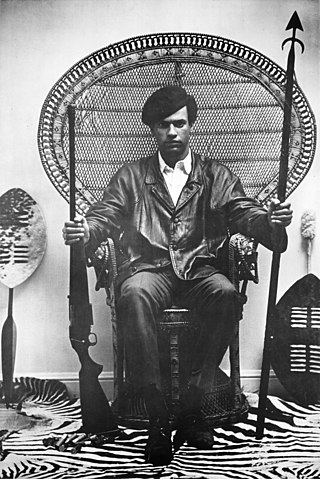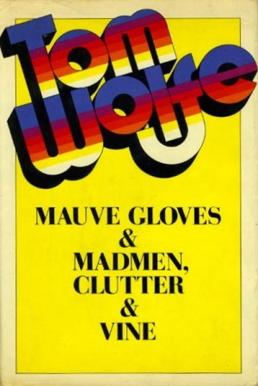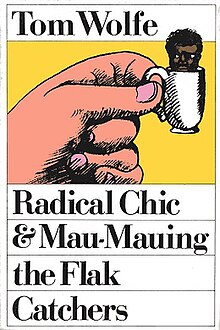
Leonard Bernstein was an American conductor, composer, pianist, music educator, author, and humanitarian. Considered to be one of the most important conductors of his time, he was the first American-born conductor to receive international acclaim. Bernstein was "one of the most prodigiously talented and successful musicians in American history" according to music critic Donal Henahan. Bernstein's honors and accolades include seven Emmy Awards, two Tony Awards, and 16 Grammy Awards as well as an Academy Award nomination. He received the Kennedy Center Honor in 1981.

Leroy Eldridge Cleaver was an American writer and political activist who became an early leader of the Black Panther Party.

Huey Percy Newton was an African American revolutionary and political activist who founded the Black Panther Party. He ran the party as its first leader and crafted its ten-point manifesto with Bobby Seale in 1966.

Thomas Kennerly Wolfe Jr. was an American author and journalist widely known for his association with New Journalism, a style of news writing and journalism developed in the 1960s and 1970s that incorporated literary techniques. Much of Wolfe's work was satirical and centred on the counterculture of the 1960s and issues related to class, social status, and the lifestyles of the economic and intellectual elites of New York City.

Mike Wallace is an American historian. He specializes in the history of New York City, and in the history and practice of "public history". In 1998 he co-authored Gotham: A History of New York City to 1898, which in 1999 won the Pulitzer Prize in History. In 2017, he published a successor volume, Greater Gotham: A History of New York City from 1898 to 1919. Wallace is a Distinguished Professor of History at John Jay College of Criminal Justice, and at the Graduate Center, CUNY.

New York is an American biweekly magazine concerned with life, culture, politics, and style generally, with a particular emphasis on New York City.

The White Panthers were an anti-racist political collective founded in November 1968 by Pun Plamondon, Leni Sinclair, and John Sinclair. It was started in response to an interview where Huey P. Newton, co-founder of the Black Panther Party, was asked what white people could do to support the Black Panthers. Newton replied that they could form a White Panther Party. The counterculture era group took the name and dedicated its energies to "cultural revolution.” John Sinclair made every effort to ensure that the White Panthers were not mistaken for a white supremacist group, responding to such claims with "quite the contrary." The party worked with many ethnic minority rights groups in the Rainbow Coalition.

Consider the Lobster and Other Essays (2005) is a collection of essays by novelist David Foster Wallace. It is also the title of one of the essays, which was published in Gourmet magazine in 2004. The title alludes to Consider the Oyster by M. F. K. Fisher.
The Panther 21 is a group of twenty-one Black Panther members who were arrested and accused of planned coordinated bombing and long-range rifle attacks on two police stations and an education office in New York City in 1969, who were all acquitted by a jury in May 1971, after revelations during the trial that police infiltrators played key organizing roles.

Radical chic is the fashionable practice of upper-class people associating with politically radical people and causes. Coined in the 1970 article "Radical Chic: That Party at Lenny's" by journalist Tom Wolfe, the term has become widely used in languages such as American English, French, and Italian. Unlike dedicated activists, revolutionaries, or dissenters, those who engage in "radical chic" remain frivolous political agitators—ideologically invested in their cause of choice only so far as it advances their social standing.

Felicia Montealegre Bernstein was an American actress born in Costa Rica.

Los Siete de la Raza was the label given to seven young Latinos from the Mission District of San Francisco, California who were involved in a 1969 altercation with police that left one officer dead. The incident and its subsequent trial became a cause célèbre of the Latin-American community and the New Left. All seven of the young men were acquitted.

Mauve Gloves & Madmen, Clutter & Vine is a 1976 book by Tom Wolfe, consisting of eleven essays and one short story that Wolfe wrote between 1967 and 1976. It includes the essay in which he coined the term "the 'Me' Decade" to refer to the 1970s. In addition to the stories, Wolfe also illustrated the book.
"Stalking the Billion-Footed Beast" is an essay by Tom Wolfe that appeared in the November 1989 issue of Harper's Magazine criticizing the American literary establishment for retreating from realism.

The Painted Word is a 1975 book of art criticism by Tom Wolfe.

The Black Panther Party was a Marxist–Leninist and black power political organization founded by college students Bobby Seale and Huey P. Newton in October 1966 in Oakland, California. The party was active in the United States between 1966 and 1982, with chapters in many major American cities, including San Francisco, New York City, Chicago, Los Angeles, Seattle, and Philadelphia. They were also active in many prisons and had international chapters in the United Kingdom and Algeria. Upon its inception, the party's core practice was its open carry patrols ("copwatching") designed to challenge the excessive force and misconduct of the Oakland Police Department. From 1969 onward, the party created social programs, including the Free Breakfast for Children Programs, education programs, and community health clinics. The Black Panther Party advocated for class struggle, claiming to represent the proletarian vanguard.

Donald Lee Cox, known as Field Marshal DC, was an early member of the leadership of the African American revolutionary leftist organization the Black Panther Party, joining the group in 1967. Cox was titled the Field Marshal of the group during the years he actively participated in its leadership, due to his familiarity with and writing about guns.
Nostalgie de la boue is a French phrase meaning the attraction to low-life culture, experience, and degradation, found at times both in individuals and in cultural movements.














